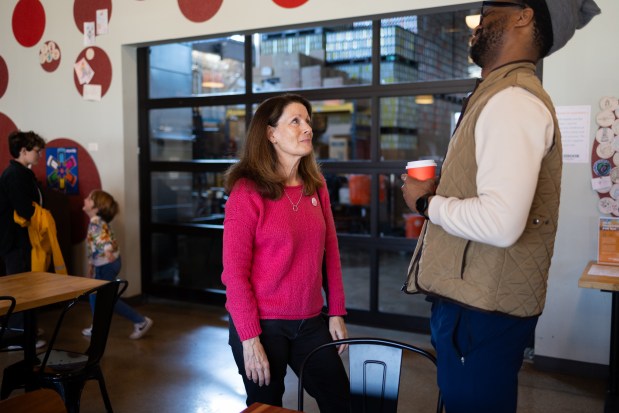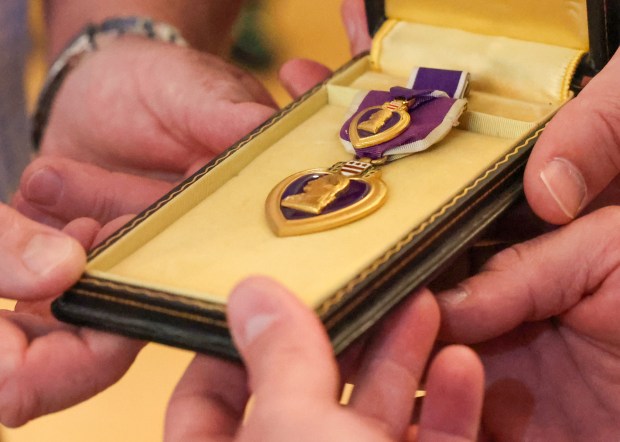In the historic election for mayor of Skokie, candidate David “Azi” Lifsics spent big dollar amounts and garnered big-name endorsements. When Election Night was over, though, he had lost to candidate Ann Tennes, who spent only a fraction of what he had shelled out.
Her winning formula in the April 1 race? Twenty years’ worth of community involvement, volunteer service and face-to-face connections in the suburb of about 67,000. She worked as Skokie’s director of marketing and communications for two decades, had been elected to Oakton (Community) College’s Board, and had volunteered for Skokie civic and arts organizations.
Illinois State Board of Elections records show that Lifsics’ Azi for Skokie campaign committee spent nearly $282,000 and got 38% of the vote, according to the Cook County Clerk’s office. That amount was quadruple the $70,000 spent by the Friends of Ann Tennes committee, and Tennes earned 50.4% of the vote. Third candidate Charles Isho spent $41,000 and got 11.6% of the vote.
Turnout for the race, historic because George Van Dusen had held the mayor’s office for 26 years and decided not to run again, was 28%, with 13,144 ballots cast, per the Cook County Clerk.
Additionally, Lifsics was endorsed by prominent elected officials including U.S. Rep. Jan Schakowsky, Illinois Lieutenant Gov. Juliana Stratton, Van Dusen, state Sen. Laura Fine, and Cook County Commissioner Josina Morita, according to his campaign’s social media.
Tennes’ win might have to do with the nature of off-cycle (non-national) elections, said Tabitha Bonilla, associate professor of political science at Northwestern University.
A smaller number of people vote in these off-cycle elections, and they tend to be older, more politically aware and have higher income levels, she said.
“So when you have someone incredibly connected, who worked for the village, people would know that,” Bonilla said. “I think that would be meaningful because the people showing up to vote would be more attentive to what (she) has done.”
Tennes, who is now Mayor Tennes after being sworn in on April 21, said, “Our campaign didn’t look political. It looked like residents talking to other residents.”
Bonilla said Tennes’ campaign practice of inviting residents to come speak with her at local establishments like Will’s Place, a cafe which employs the developmentally disabled, fostered her image as accessible.
“It builds a narrative of her being for ordinary people,” Bonilla said.
In an age when political fundraising and big bucks can play a deciding role in an election, Tennes’ win proves this isn’t always the case.
Randall Roberts, who chaired Tennes’ mayoral campaign, acknowledged he had concerns Lifsics’ endorsements and campaign spending could harm the Tennes campaign.
“I think what residents saw was that Ann was the best candidate and best qualified person,” Roberts said. “Despite the campaign they were being blitzed with, they saw through it and elected the best candidate—and in an overwhelming fashion.”

Tennes, who received a “highly recommended” ranking from the newly formed Skokie Community Caucus and endorsements from a number of citizens, business owners and former village employees, credits her success to meeting voters where they are—at their homes, businesses, and village events—and building an enthusiastic volunteer base that was largely through word of mouth.
“I made a point of being present and engaging with residents,” Tennes said. “It was a lot of personal contact.”
Keith Simonds, assistant professor of political science at Oakton College, noted that more than $200,000 spent in a suburban mayoral race is a “large amount,” but is not unheard of.
Recent instances show very costly campaigns haven’t had the intended impact, he said.
“We … just saw massive spending for the Wisconsin Supreme Court race,” he said. “The winning side was outspent by millions of dollars. Money is important, but it is not the only thing that matters.”
Lifsics said that building name recognition was a necessary part of his campaign, and raising the amount of money needed to fund mailers and commercials tied into that. His campaign created 10 mailers and six commercials, which aired on YouTube, Hulu and Comcast channels, Lifsics said.
“I had about 13% name recognition the first few weeks of the campaign, so we had a lot of ground to make up,” he said.. “It was not issue-based; it was more about getting my name out there. Once voters figured out who I was, then I could go discuss policy positions.”
For Tennes, name recognition, gained through her position as Skokie’s director of communications and marketing from 1998 to 2023, an elected seat on the Oakton (Community) College Board from 2007 to 2019, and involvement in a number of Skokie organizations, including the Skokie Community Foundation, the North Shore Center for the Performing Arts in Skokie Foundation, and more, made a difference in the campaign, she said.
“I had strong relationships in the community that I cultivated over the course of 25 years—and that certainly was a benefit,” she said.
Roberts agreed.
“She was very well known and that was ideal for her as a candidate,” he said.
Tennes also stressed her status as a fully independent candidate, calling for “transparent, practical leadership centered on inclusion and collaboration.” Skokie residents were already looking for independent candidates after approving a citizen-initiated referendum in November 2024 that removed local party affiliation from the ballot in municipal races, Tennes said.
Previously, the Skokie Caucus Party had dominated village elections.
“It was clear residents were not looking for slates and groups of candidates running together,” Tennes said, referring to the 2024 referendum results. “I ran a fiercely independent campaign. I said over and over again on the campaign trail. I was friendly and cordial with all the candidates (for trustee and village clerk), but I did not campaign with them.”
Van Dusen said he supported Lifsics because he had started attending Skokie Village Board meetings about three years ago and told Van Dusen he was interested in village government. The two met periodically to chat about issues.
“I was discussing issues with him and I was impressed with his approach and how he analyzed issues. I thought he was what the village of Skokie needed,” Van Dusen said.
Still, Van Dusen said he’s pleased with the outcome of the election.
“Ann will do a good job,” he said.
Despite the fact Tennes worked for him yet he chose to endorse another candidate, Van Dusen said he never had a falling out with her.
“No, and I’ve never said anything negative about Ann,” he noted. “She’ll have my support, and I think she’ll do a good job.”
Tennes said soon after the election that she planned to meet with Isho, an Assyrian American, and tell him how much she values Skokie’s growing Assyrian American community.
For his part, Lifsics also heralded Tennes’ win.
“I want to congratulate our Mayor-elect Ann Tennes,” he wrote on his Facebook page the day after the election. “I’ve reached out to her to offer my assistance in any way as Skokie moves forward…Let’s all work together to keep Skokie a great place to live!”




